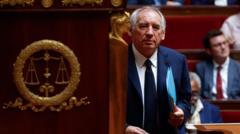What’s Fueling France’s Political Crisis and What’s Next?

Published: 2025-09-08 16:45:16 | Category: world
François Bayrou, the French Prime Minister, is likely to lose a confidence vote, highlighting the ongoing political turmoil in the National Assembly and President Emmanuel Macron's struggle to maintain stability in his government. Bayrou's minority administration has proposed significant budget cuts to address France's escalating public debt, but faces considerable opposition, raising questions about the future direction of French politics.
Last updated: 10 October 2023 (BST)
Key Takeaways
- François Bayrou is expected to lose a confidence vote, raising uncertainty in the French government.
- Macron's decision for a snap election in June 2024 resulted in a hung parliament, complicating governance.
- France's public debt has reached €3,345 billion, approximately 114% of GDP.
- Bayrou advocates for budget cuts to address France's long-standing debt crisis.
- Opposition parties suggest alternative solutions, including tax hikes rather than spending cuts.
The Current Political Landscape
As of October 2023, François Bayrou's tenure as Prime Minister of France appears to be nearing an end. Bayrou, who was appointed in December 2022, has faced increasing challenges in a fragmented National Assembly following the 2024 parliamentary elections. The political situation has become increasingly unstable, with speculation mounting over both Bayrou's future and that of President Macron as they navigate these tumultuous waters.
Macron's Gamble and Its Consequences
In June 2024, President Macron made a high-stakes decision to call a snap parliamentary election, hoping to secure a clear majority after his party suffered significant losses in the European Parliament vote. The outcome, however, was far from what he had hoped. Instead of gaining a majority, Macron's party found itself in a hung parliament, leading to a fragmented legislative body where no single party holds a decisive advantage.
This political division has hindered the ability of any Prime Minister to pass legislation or budgets effectively. Bayrou's government, operating as a minority, has struggled to rally support for its proposed budget cuts aimed at tackling France's mounting public debt. The situation reflects a broader trend of instability within Macron's administration, with Bayrou set to become the fourth Prime Minister in less than two years.
France's Debt Crisis
At the heart of Bayrou's proposed policies is the urgent need to address France's public debt crisis. As of early 2025, France’s public debt is reported to be around €3,345 billion, representing an alarming 114% of the country's GDP. This figure positions France as having the third-highest public debt in the eurozone, following Greece and Italy, translating to nearly €50,000 for every citizen.
The government's budget deficits reflect a troubling trend; last year, the deficit stood at 5.8% of GDP, with projections indicating a slight improvement to 5.4% this year. However, this still underscores the ongoing challenges France faces in balancing its budget and managing its financial obligations.
Adding to the complexity of this issue is France's demographic shift, characterised by an ageing population. With fewer workers contributing taxes and a growing number of citizens relying on state pensions, the financial strain on public services is expected to intensify. Bayrou has been vocal about the need to redefine and perhaps reduce generous social programmes, such as pensions, to mitigate this crisis.
Opposition and Calls for Change
Despite Bayrou's efforts to advocate for budget cuts, significant opposition has emerged from various political factions. The government of his predecessor collapsed over similar issues, highlighting the sensitivity surrounding proposals to cut spending. Left-leaning parties have called for tax increases instead, arguing that raising taxes on wealthier individuals and corporations could provide a more sustainable solution to the nation’s fiscal challenges.
As Bayrou prepares for the confidence vote, he faces mounting pressure from both the left and right. The far-right National Rally, led by Marine Le Pen, has demanded an early dissolution of the National Assembly and a new round of parliamentary elections. However, many political analysts believe that such elections would likely yield similar results, perpetuating the current deadlock.
The Road Ahead: What Happens Next?
Should Bayrou lose the confidence vote, President Macron will be confronted with a series of difficult decisions. One option would be to appoint a fifth Prime Minister in less than two years, but this individual would face the same challenges as their predecessors in navigating a divided parliament. The last two Prime Ministers, Michel Barnier and Bayrou, both took weeks to secure their appointments, indicating that finding a suitable candidate willing to take on this challenging role may be a protracted process.
In the interim, Bayrou may remain as a caretaker Prime Minister, overseeing a government in limbo while discussions intensify around his potential successor. Analysts suggest that Macron might consider appointing a candidate from the left, as the recent elections saw a strong showing from leftist parties. Names such as Olivier Faure, leader of the Socialist Party, or former Prime Ministers like Bernard Cazeneuve, have emerged as potential candidates.
Possible Successors and Political Dynamics
If Macron opts to continue with candidates from the centre or right, he may look to figures such as Sébastien Lecornu, the current Defence Minister, or Catherine Vautrin, the Minister of Labour and Health. Others within Macron's government, like Interior Minister Bruno Retailleau and Justice Minister Gérald Darmanin, are also under consideration.
The challenge lies not only in finding a suitable candidate but also in ensuring that this individual can garner enough support from the diverse factions within the National Assembly. The political landscape remains fraught, with the looming shadow of the 2027 presidential election influencing potential candidates' willingness to assume the role of Prime Minister under Macron's administration.
Conclusion
The potential fall of François Bayrou represents a critical juncture for French politics. As the country grapples with a significant public debt crisis and a politically fragmented National Assembly, the ramifications of this confidence vote will reverberate throughout the government. With pressure mounting for immediate action, the decisions made by President Macron in the coming days could shape the trajectory of his administration and the future of France's political landscape.
As the situation unfolds, it raises poignant questions about the effectiveness of current governance structures in France and the potential for reform. Will France see a shift towards a more unified approach in tackling its financial issues, or will the cycle of political instability continue? The answers remain uncertain, but one thing is clear: the stakes are high for both Macron and the future of French politics. #FrenchPolitics #Macron #Bayrou
FAQs
What is the confidence vote that François Bayrou is facing?
The confidence vote is a parliamentary process where members of the National Assembly will decide whether to support Bayrou’s government. A loss could lead to his resignation and further political instability.
Why is France facing a public debt crisis?
France's public debt crisis stems from decades of government spending exceeding revenue. As a result, the government has relied on borrowing to fund its budget, leading to a current debt level of approximately €3,345 billion.
What are the implications of a hung parliament for governance in France?
A hung parliament means no single party has a majority, making it difficult for the government to pass legislation or budgets. This often leads to political deadlock and instability.
What alternatives to budget cuts are being proposed?
Opposition parties, particularly on the left, advocate for tax increases rather than spending cuts. They argue that raising taxes on wealthier individuals could provide a more sustainable solution to France's financial challenges.
Who might succeed François Bayrou if he loses the vote?
Potential successors include Olivier Faure from the Socialist Party, or if Macron opts for a candidate from the centre-right, figures like Sébastien Lecornu or Catherine Vautrin could be considered.



